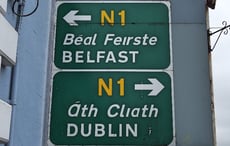An Irish man has been interviewed on suspicion of involvement in an international online scam as authorities warn consumers to be careful.
An Irish man in Co Roscommon was interviewed on April 10 after being suspected of involvement with a “sophisticated” scam after German authorities attempted to purchase approximately 10 million face masks worth about €15 million from what turned out to be a “cloned” website.
Read More: HSE says 20% of PPE from China "unsuitable" for Irish healthcare workers
Speaking on RTE Radio’s “Today with Sean O’Rourke,” Chief Superintendent Pat Lordan of the Garda National Economic Crime Bureau said: “One of the authorities in Germany was seeking to purchase face masks. They had a regular dealing with a company in Spain.
“When they went to purchase the masks, they thought they were buying them from this company in Spain, but in fact, they weren’t, they were on a cloned website. A group of criminals had cloned the genuine website.
“That website subsequently wasn’t able to provide the masks. They were referred then through an Irish intermediary to a Dutch company who again transpired to be a cloned website.
“So it’s quite a sophisticated scam involving quite a number of countries throughout Europe.”
Speaking to the Irish involvement in the case, Lordan said: “€1.5 million came into an Irish bank account, we became aware of that money almost two weeks ago. Working with the financial institutions here in Ireland, that money was frozen and that money will be returned to its rightful owner.
“The investigation is ongoing here in Ireland. One man has been interviewed in relation to this matter here in Ireland and further inquiries are ongoing.”
Lordan said the investigation is ongoing but that one man has been interviewed in Ireland. He added that his department has been working with colleagues in Roscommon, in addition to assistance from Interpol, Europol, Eurojust, and counterparts in Germany, Holland, Spain, and the UK.
Lordan said that almost all of the money will be recovered to Germany. “They will not lose a lot of money in this case, they’re one of the lucky ones.”
Lordan went on to say that online scams are not unique to the coronavirus crisis. “We’re seeing these scams every day of the week, COVID-19 or no COVID-19. Every issue in the public domain creates a new opportunity for the criminals, and COVID-19 provides that perfect opportunity because we’re all buying online.
“We need to be careful online. Is the website we’re on real? We’re seeing more and more websites set up throughout the world that are not real, that really look like the original website of the real company, but if you go behind it, it’s not the real company.
Lordan acknowledged that it’s “quite difficult” to determine whether or not a website is real, but encourages consumers to check the emails, phone numbers, addresses, and or bank accounts the website is displaying, as well as the security of the website.
“Oftentimes if you go in through a link, through an email, through something you get on social media, it will bring you to bogus websites.”




Comments